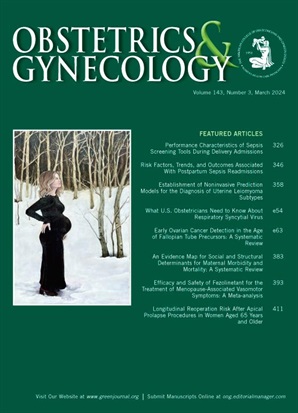在提供生殖健康护理时解决健康的社会和结构性决定因素:美国妇产科协会委员会第 11 号声明。
IF 5.7
2区 医学
Q1 OBSTETRICS & GYNECOLOGY
引用次数: 0
摘要
健康的社会和结构性决定因素包括历史、社会、政治和经济力量,其中许多根植于种族主义和不平等,这些因素决定了环境条件与个人健康之间的关系。未满足的社会需求会增加妇产科医生(ob-gyns)治疗的许多疾病的风险,包括但不限于早产、意外怀孕、不孕症、宫颈癌、乳腺癌和孕产妇死亡。医护人员个人的偏见(无论是明显的还是无意识的)都会影响医疗服务的提供,并可能通过不公平的待遇加剧和强化健康差距。妇产科医生和其他医护人员应努力理解患者的医疗决策,而不仅仅是患者个人层面的行为,而是相互交织的社会政治条件、结构性不平等和社会需求的结果,这些因素造成并维持了健康和医疗方面的不平等。认识到健康的社会和结构性决定因素的重要性,有助于妇产科医生和其他医疗保健专业人员更好地了解患者,有效地沟通与健康相关的状况和行为,并有助于改善健康结果,包括患者的医疗体验和他们对医疗保健系统的信任。本文章由计算机程序翻译,如有差异,请以英文原文为准。
Addressing Social and Structural Determinants of Health in the Delivery of Reproductive Health Care: ACOG Committee Statement No. 11.
Social and structural determinants of health include historical, social, political, and economic forces, many of which are rooted in racism and inequality, that shape the relationship between environmental conditions and individual health. Unmet social needs can increase the risk of many conditions treated by obstetrician-gynecologists (ob-gyns), including, but not limited to, preterm birth, unintended pregnancy, infertility, cervical cancer, breast cancer, and maternal mortality. An individual health care professional's biases (whether overt or unconscious) affect delivery of care and may exacerbate and reinforce health disparities through inequitable treatment. Obstetrician-gynecologists and other health care professionals should seek to understand patients' health care decision making not simply as patients' individual-level behavior, but rather as the result of intersecting sociopolitical conditions, structural inequities, and social needs that create and maintain inequalities in health and health care. Recognizing the importance of social and structural determinants of health can help ob-gyns and other health care professionals to better understand patients, effectively communicate about health-related conditions and behavior, and contribute to improved health outcomes, including patients' experience of care and their trust in the health care system.
求助全文
通过发布文献求助,成功后即可免费获取论文全文。
去求助
来源期刊

Obstetrics and gynecology
医学-妇产科学
CiteScore
11.10
自引率
4.20%
发文量
867
审稿时长
1 months
期刊介绍:
"Obstetrics & Gynecology," affectionately known as "The Green Journal," is the official publication of the American College of Obstetricians and Gynecologists (ACOG). Since its inception in 1953, the journal has been dedicated to advancing the clinical practice of obstetrics and gynecology, as well as related fields. The journal's mission is to promote excellence in these areas by publishing a diverse range of articles that cover translational and clinical topics.
"Obstetrics & Gynecology" provides a platform for the dissemination of evidence-based research, clinical guidelines, and expert opinions that are essential for the continuous improvement of women's health care. The journal's content is designed to inform and educate obstetricians, gynecologists, and other healthcare professionals, ensuring that they stay abreast of the latest developments and best practices in their field.
 求助内容:
求助内容: 应助结果提醒方式:
应助结果提醒方式:


